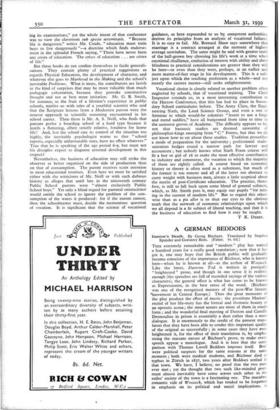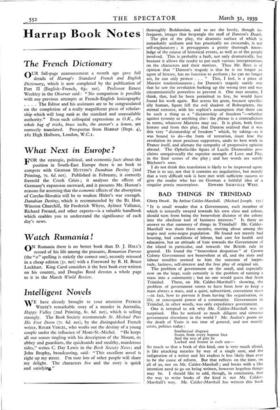A GERMAN BEDDOES
Danton's Death. By Georg Buchner. Translated by Stephen Spender and Goronwy Rees. (Faber. 7s. 6d.)
Tins extremely remarkable and " modern " play has waited a hundred years for a really good translation ; now that it has got it, one may hope that the British public will gradually become conscious of the importance of Biichner, who is known here—when he is known at all—as the author of Wozzeck. Like the latter, Dantons Tod is written in poetically " heightened " prose, and though in one sense it is realistic enough (the speeches are full of recorded sayings of the various characters), the general effect is what has come to be known as Expressionist, in the best sense of the word. (Buchner was one of the recognised masters of the post-War literary movement in Central Europe.) Thus the great moments of the play produce the effect of music: the prostitute Marion% recital of her life-story has the formal and thematic beauty of an operatic scena ; the street scenes are most of them in rondo form ; and the wonderful final meeting of Danton and Camille Desmoulins in prison is essentially a duet rather than a mere dialogue. It is enormously to the credit of the present trans- lators that they have been able to render this important qualit' of the original so successfully ; in some cases they have ever heightened it, for the effect of their translation is, by empha- sising the staccato nature of Bilchner's prose, to make ever: speech appear a monologue. And it is here that the com- parison with Thomas Lovell Beddoes imposes itself. Bot1 were political suspects for the same reasons at the same moment ; both were medical students, and Biichner died ot typhus in Zurich in 1837, two years after Beddoes settled in that town. We have, I believe, no proof that the two mei: ever met ; yet the thought that two such like-minded poet- must almost inevitably have come across each other in the exiles' society of the town is a fascinating one. The macabre. romantic side of Wozzeck, which has tended to be forgotten in emphasis on its political and social implications. thoroughly Beddoesian, and so are the lovely, though in- frequent, images that bespangle the stuff of Danton's Death.
The plot of the play, the dramatic surface of which is remarkably uniform and has practically no crescendo, is not self-explanatory ; it presupposes a pretty thorough know- ledge of the course of historical events, as well as of the people involved. This is probably a fault, not only dramatically, but because it allows the reader to put such various interpretations on the characters and their motives. Thus Mr. Rees is of opinion that " Danton's tragedy is that he is no longer an agent of history, has no function to perform ; he can no longer act, he can only protest . . . " This, I feel, is a piece of Marxist tendentiousness ; for Danton's tragedy surely was that he saw the revolution barking up the wrong tree and was circumstantially powerless to prevent it. One may assume, I think, that, had he been permitted to live, he would have found his work again. But across his great, because specific- ally human, figure fell the evil shadow of Robespierre, the eternal terrorist, with his sophist's assumption that there can be such a thing as a " dictatorship of freedom "—whether against tyranny or anything else : the phrase is a contradiction in terms, whatever Marxists may say. It is plain, both from history and from this play, that Danton realised that it was this very " dictatorship of freedom " which, by taking—as it was bound to do—the form of terrorism, must lose the revolution its most preciouS supporters, undo its best work in France itself, and alienate the sympathy of progressive opinion abroad. The Ophelia-like figure of Lucile Desmoulins pro- claims unequivocally the superior strength of Love and Pity, in the final scenes of the play ; and her words are surely Biichner's own.
I do not think this translation is likely to be improved upon. That is to say, not that it contains no angularities, but merely that a very difficult task is here met with sufficient success to give the reader who has no German a faithful idea of a



































































 Previous page
Previous page